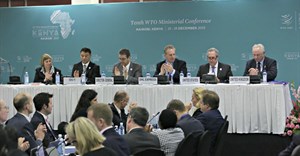Subscribe & Follow
Shake-up for Vodacom's Congo operation
This, according to analysts, could pose a challenge for Vodacom Congo, the second-biggest operator in that country with 34% market share. Vodacom Congo is the struggling entity in the Vodacom stable, while its sister companies in Lesotho, Mozambique and Tanzania are performing fairly well.
Vodacom derives more than 90% of its revenue from its South African operations.
The impasse between Vodacom Congo's shareholders, Vodacom and the Congolese Wireless Network, over funding and operational agreements has also created uncertainty. The two are participating in International Chamber of Commerce arbitration and have also hired an investment bank to evaluate options for the group.
According to Vodacom's annual report for this year, a possible resolution may include an exit from the Congo. There are also legal woes in the form of a service provider making allegations that fees were left unpaid by Vodacom. The firm is defending the matter.
There are five licensed mobile operators in the country - Vodacom Congo, Airtel Congo , Tigo Congo, Congo Chine Telecom (CCT) and Supercell.
The Congo had an estimated population of 66-million last year but cellphone penetration is only 15%. This rate is relatively low compared with the average of 50% in sub-Saharan Africa, says research firm Frost & Sullivan. This means there are still considerable growth opportunities in the country.
As a result, many global players have been eyeing countries such as the Congo to sustain their organic growth, says Mervin Miemoukanda, an information, communications and technology industry analyst at Frost & Sullivan.
He says France Telecom is in discussions with Chinese telecom vendor ZTE over a possible buyout of its shares in CCT. CCT is 51% owned by ZTE and the remainder by the Congo government.
However, Miemoukanda says if the negotiations are successful, Orange is not likely to shake up the market in the short term. But the company is expected to chip away its competitors' subscribers in the medium to long term.
As a result, Vodacom Congo and Bharti Airtel Congo, which has 38% of the market share, are expected to lose their leading position. This will most likely put pressure on their profit margins if remedial strategies are not taken, he says.
But Vodacom spokesman Richard Boorman says the group's international revenue continues to improve despite competition.
"The number of customers at the end of June was 4,2-million, which is an increase of 24% year on year. Churn is down slightly year on year and (average revenue per user) in US dollar terms is down 8% (year on year)," he says.
Miemoukanda says Orange has been successful in expanding into Francophone countries. "For example, in Mali, Orange adopted a strategic deployment approach with focus on the rural market," he says. "This strategy has proven to be successful and has been a key driver for the company's exceptional growth. Frost & Sullivan expects Orange to replicate such deployment strategy in the Congo, as CCT has limited network infrastructure in the Congo," says Miemoukanda.
Spiwe Chireka, a telecoms programme manager in Africa for global research firm IDC, agrees with Mr Miemoukanda, saying that if France Telecom enters the Congo it will not struggle to find its feet because of cultural similarities.
She says the Congo has been challenging for international companies operating there, especially since some parts of the country are not accessible while there are also illegal network connections in other areas.
However, "there is a sense of complacency among the operators. Orange has potential to shake things up in the market".
France Telecom already has a presence in 14 African countries.
Vodacom Congo may be hard hit by the entrance of Orange if the conflict between the Vodacom Group and Congolese Wireless Network is not resolved, says Miemoukanda.
He says Vodacom Congo should not exit the market as most countries on the continent have stopped issuing new mobile licences and have high mobile penetration rates.
"The Congo, along with Ethiopia, remains one of the few countries in sub-Saharan Africa with massive growth opportunities in the long term.
"Therefore, exiting the Congo could be a suicidal strategy for the company," he says.
Source: Business Day
Source: I-Net Bridge

For more than two decades, I-Net Bridge has been one of South Africa’s preferred electronic providers of innovative solutions, data of the highest calibre, reliable platforms and excellent supporting systems. Our products include workstations, web applications and data feeds packaged with in-depth news and powerful analytical tools empowering clients to make meaningful decisions.
We pride ourselves on our wide variety of in-house skills, encompassing multiple platforms and applications. These skills enable us to not only function as a first class facility, but also design, implement and support all our client needs at a level that confirms I-Net Bridge a leader in its field.
Go to: http://www.inet.co.za





